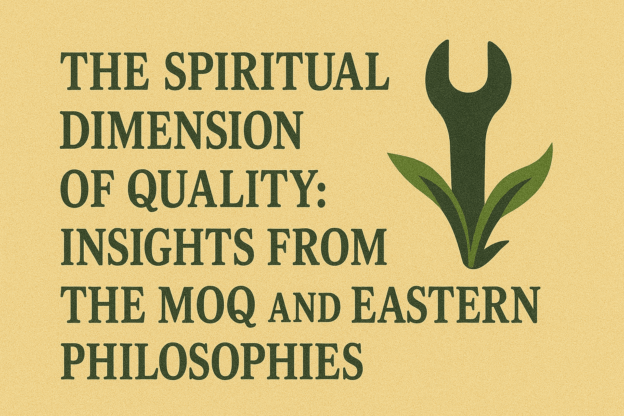Examining the spiritual implications of the Metaphysics of Quality (MOQ), including its connections to Eastern philosophies and its potential to foster a deeper sense of meaning and purpose.
Introduction
Robert M. Pirsig’s Metaphysics of Quality (MOQ) offers a rich philosophical framework that positions quality as the core of existence. This concept not only challenges materialistic and reductionist views but also carries profound spiritual implications. The MOQ’s connections to Eastern philosophies, particularly Zen Buddhism and Taoism, provide a pathway to deeper meaning and purpose. This article delves into the spiritual aspects of the MOQ, exploring its connections to mindfulness, the Tao, and the broader spiritual growth it fosters.
Quality as a Spiritual Concept
Quality as Fundamental Reality
At the heart of the MOQ lies the idea that quality is not merely an attribute or measure but the primary reality from which all things arise. This intrinsic value and interconnectedness resonate with many spiritual traditions that emphasize unity and the inherent worth of all aspects of existence.
- Transcendence and Immanence: Quality transcends the dualities of subject and object, mind and matter. This idea aligns with spiritual concepts of transcendence (going beyond ordinary experience) and immanence (the presence of the divine in the material world). Quality is both the foundation and manifestation of reality, offering a bridge between the mundane and the sacred.
- Intrinsic Value: The emphasis on intrinsic value in the MOQ parallels spiritual teachings that recognize the inherent worth of all beings and things. This perspective fosters a deep reverence for life and the universe, encouraging a spiritual attitude of respect, gratitude, and compassion.
Connections to Eastern Philosophies
Zen Buddhism
Zen Buddhism, with its emphasis on mindfulness, presence, and the direct experience of reality, provides a rich context for understanding the spiritual dimensions of the MOQ.
- Mindfulness and Presence: Zen practices focus on being fully present in the moment, a state of mindfulness that enhances the perception of quality in everyday life. Mindfulness involves paying attention to the present experience with openness and without judgment, aligning with Pirsig’s focus on appreciating quality in the here and now. In “Zen and the Art of Motorcycle Maintenance,” Pirsig describes motorcycle maintenance as a meditative practice that reveals the intrinsic quality of the task, transforming it into a spiritual experience.
- Direct Experience: Zen emphasizes direct, unmediated experience as the path to true understanding, resonating with Pirsig’s idea that quality is best understood through direct engagement with life rather than abstract concepts. Practices like zazen (seated meditation) encourage practitioners to observe thoughts and sensations without attachment, fostering a direct experience of the present moment and its inherent quality.
Taoism
Taoism, another Eastern philosophy, emphasizes living in harmony with the Tao, the fundamental principle that underlies and unites all things. This concept offers profound insights into the MOQ’s spiritual dimensions.
- The Tao and Dynamic Quality: The Tao represents the natural, effortless flow of the universe, akin to Pirsig’s dynamic quality, which embodies change, creativity, and the spontaneous emergence of new possibilities. The Taoist concept of wu wei (non-action) refers to actions in perfect harmony with the natural flow of life, aligning with dynamic quality where innovation and change occur naturally and without force.
- Balance and Harmony: Taoism teaches the importance of balancing opposites, yin and yang, to achieve harmony. Similarly, the MOQ emphasizes balancing static and dynamic quality. This balance is essential for maintaining stability while embracing change, reflecting the Taoist principle of harmony through balance. The yin-yang symbol represents the interdependence of opposites, illustrating that dynamic and static qualities are complementary and essential for a holistic understanding of reality.
Fostering Meaning and Purpose
Enhancing Perception
Focusing on quality enhances our perception of life’s richness and depth. By cultivating mindfulness and presence, individuals can experience the intrinsic quality of each moment, leading to greater appreciation and fulfillment.
- Practice: Engage in daily mindfulness meditation to become more aware of the quality present in life, fostering a deeper connection to experiences and surroundings.
Encouraging Balance
Balancing static and dynamic quality encourages a harmonious approach to life. Embracing stability and order while remaining open to change and innovation allows for continuous growth and adaptability.
- Practice: Develop routines that include both structured activities and opportunities for spontaneous exploration, promoting well-being and spiritual growth.
Fostering Creativity and Innovation
Dynamic quality’s emphasis on creativity and change encourages individuals to explore new possibilities and push beyond conventional boundaries. This creative engagement with life is a key aspect of spiritual growth, fostering a sense of discovery and purpose.
- Practice: Pursue creative hobbies or learn new skills to stimulate dynamic quality, providing a sense of achievement and enhancing spiritual fulfillment.
Connecting with the Universe
Recognizing quality as the fundamental essence of reality fosters a sense of interconnectedness with the universe. This spiritual perspective encourages a holistic view of life, where individual actions and experiences are seen as part of a greater whole.
- Practice: Spend time in nature and reflect on your place in the larger scheme of things to deepen this sense of connection, promoting spiritual insights and growth.
Conclusion
The spiritual dimension of Robert M. Pirsig’s Metaphysics of Quality offers profound insights into the nature of reality and our place within it. By integrating the MOQ with Eastern philosophies like Zen Buddhism and Taoism, we can enhance our understanding of quality and its role in spiritual growth. Emphasizing mindfulness, balance, creativity, and interconnectedness fosters a deeper connection to life’s intrinsic quality, enriching our spiritual journey and providing a holistic framework for living with purpose and fulfillment. As we navigate the complexities of modern life, these timeless principles remind us of the profound depth and richness inherent in every moment, guiding us toward a more harmonious and spiritually enriched existence.
